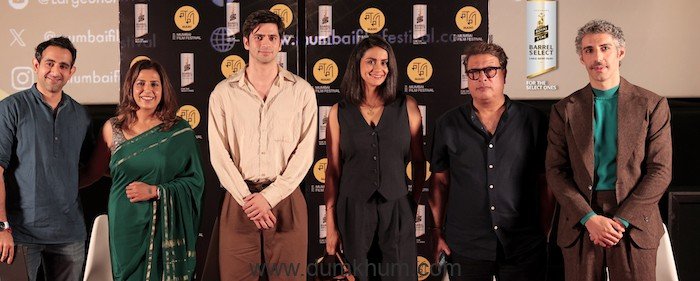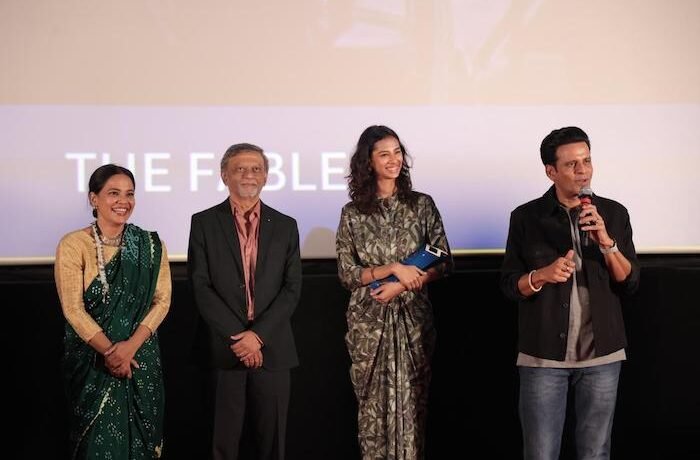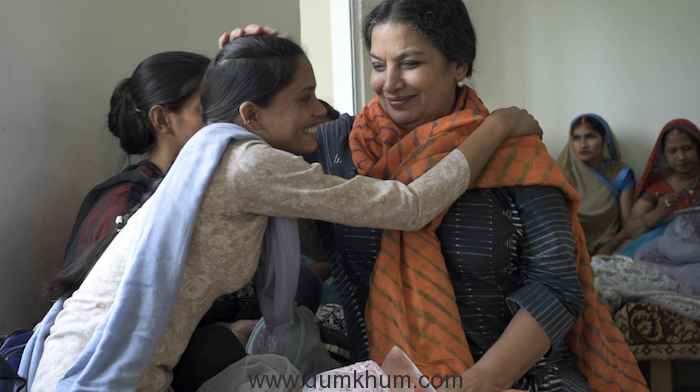Full Programme Announced For UK Asian Film Festival 2019
The World’s Longest Running South Asian Film Festival Outside India.
Feminist-focused Festival Celebrates 21 Years With ‘Revolution’ Theme.
Festival Programme To Run Across Five Cities.
Edinburgh, Glasgow, Leicester, London, Manchester, 27th March – 4th May 2019.
The world’s longest running South Asian film festival outside of India, UK Asian Film Festival, has announced its full programme for 2019. The festival will run in five cities across the UK, Edinburgh, Glasgow, Leicester, London and Manchester, 27th March – 4th May 2019, supported by the BFI with National Lottery funding and Regional Screen Scotland.
At a time of significant change, UK Asian Film Festival marks its 21st anniversary with a curation inspired by the theme of Revolution. Historically known as Tongues on Fire and then London Asian Film Festival, the festival is also synonymous with championing South Asian feminist films and supporting pioneering, female artists and auteurs.
Honouring Revolution through the vehicle of South Asian Cinema, UK Asian Film Festival looks at the #MeToo movement gathering momentum in the Indian and Pakistani film industries and the decriminalisation of homosexuality and the repeal of Section 377 in India last year. UK Asian Film Festival will celebrate pioneering icons from South Asian cinema and present a series of milestone films that signify society-led change.
The Opening Gala Launch on Wednesday 27th March, The May Fair Hotel, London will feature an In Conversation with Zeenat Aman, one of the most revolutionary actresses in the history of Indian cinema. Game-changer, beauty queen and reigning star of the 1970s and 1980s, Aman will share her extraordinary journey in Indian cinema. She redefined the archetypal heroine in Indian cinema in an era when they played secondary characters, largely obedient wives and lovers that elevated and served to affirm the male lead onscreen. Drawn to more unconventional roles, she was credited with making a lasting impact on the image of leading actresses by introducing a bold and modern look to Hindi cinema. From the disenchanted, pot-smoking hippie in Hare Rama Hare Krishnaand the opportunist who leaves her unemployed lover for a millionaire in Roti, Kapda Aur Makaanto the girl who falls in love with her mother’s one-time lover in Prem Shastra, the disfigured temple singer yearning for love in Satyam Shivam Sundaramand a woman married to a caustic cripple but involved in an extramarital relationship in Dhund, Aman wasan inspiration for so many other heroines, forging her own identity by championing distinguished roles. Equally, her conventional films like Chori Mera Kaam, Dostana, Lawaaris and Qurbani are considered to be landmarks in Indian cinema.
The World Premiere of the documentary film Kaifinama will be screened on Sunday 7th April, BAFTA 195, London and on Friday 12th April, Glasgow Film Theatre followed by Q&A’s with veteran actress, Shabana Azmi. The film looks at the life and art of the progressive, Urdu poet, Kaifi Azmi, celebrating his birth centenary. Azmi was both a revolutionary poet for social change as well as one of the foremost lyricists in the Hindi film industry. Not content to limit himself to fine writing, he worked ceaselessly throughout his life as a catalyst for change among the disenfranchised. This extraordinary journey is documented through extensive interviews with Azmi and his wife Shaukat Kaifi as well as insights from his children, Shabana and Baba Azmi, and reminiscences by his friends and colleagues.
Shabana Azmi will also be conducting an Actor’s Masterclass on Saturday 6th April, Phoenix Cinema, Leicester. One of the most versatile actresses in Indian cinema, having mastered both commercial and arthouse genres, the internationally lauded actress believes art should be instrumental in leading social change. Her entry into films marked the way for the Parallel Cinema Movement with Shyam Benegal’s Ankur in 1974. She has won five National Awards for Best Actress and five International Awards for Best Actress. Azmi is also highly respected as a social activist and tireless campaigner for the rights of women, slum dwellers and the underprivileged. A former UN Goodwill Ambassador for Population and Development, she was recently nominated as a Global Leadership Ambassador for The Women in Public Service Project initiated by Hillary Clinton.
The Closing Flame Awards Gala on Sunday 7th April, BAFTA 195, London will feature an In Conversation with Ramesh Sippy. Veteran director and producer Sippy’s film credits include one of Indian cinema’s most iconic films of all time, Sholay (1975), which reinterpreted the spaghetti western genre within the structure of Indian cinema, ranked first in the BFI’s 2002 poll of the Top Ten Indian Films of all time. Winner of India’s civilian honour, the Padma Shri, Sippy’s other directing credits include other timeless classics such as Andaz (1971);Seeta Aur Geeta (1972); Shaan (1980); and Saagar (1985) among others. This will be followed by the presentation of the UK Asian Film Festival Awards.
The festival will also feature several World Premieres of revolutionary films by female directors. The Closing Film on Saturday 6th April, Courthouse Hotel, Shoreditch will be the World Premiere of Pinky Memsaab (2018, Dir. Shazia Ali Khan). Emblematic of new age Pakistani cinema for a world audience and reflecting the industry’s nascent revival, Pinky Memsaab is a drama that depicts different perspectives of the NRI experience in Dubai. The lives of a gullible maid; a beautiful socialite; an ambitious investment banker; and a happy go lucky chauffer are entwined together in Dubai in this bittersweet take on self-discovery. The screening will be followed by a Q&A with director Shazia Ali Khan and cast members. Additional screenings will take place on Thursday 4th April, Glasgow Film Theatre; Saturday 6th April, Phoenix Cinema, Leicester; and Saturday 4th May, HOME, Manchester.
The World Premiere of KD (2019, Dir. Madhumita) on Tuesday 2nd April, Rich Mix London and on Thursday 4th April 2019, Phoenix Cinema, Leicester explores a fundamental human right: the right to live. An 80-year-old man overhears his children say they want him dead to claim his inheritance. Scared, he runs away from home and encounters a courageous, 8-year-old orphan who helps him to live for himself. Madhumita is a prolific Indian writer-director working primarily in Tamil cinema. Her first short film won the BBC Award in the Best in the World category. The London screening will be followed by a Q&A with producer Shoaib Lokhandwala.
Bengali film Chegu (2018, Dir. Nabamita) has its World Premiere on Sunday 31st March, Rich Mix, London followed by a screening on Saturday 6th April, Phoenix Cinema, Leicester. The film tells the story of a young boy from the lower middle class that will fight his own battles by taking inspiration from Marxist revolutionary, Che Guevara. Cheguaddresses multiple social issues through the eyes of the teenager, the ideals of Guevara forming a key part of the narrative. The Rich Mix screening will be followed by a Q&A with director Nabamita and the production team.
Noblemen (2019, Dir. Vandana Kataria) has its UK Premiere on Monday 1st April, Regent Street Cinema, London followed by screenings on Wednesday 3rd April, Phoenix Cinema, Leicester; and Wednesday 1st May, HOME, Manchester. The film sees the loss of a 15-year-old boy’s innocence as he prepares to star in a production of Shakespeare’s The Merchant of Venice when he rebels against a gang of bullies in a posh boarding school. The London and Leicester screenings will be followed by a Q&A with producer Shoaib Lokhandwala.
Roopa Barua’s documentary Daughters of the Polo God focuses on young women charging forward to play the traditional male dominated game of polo despite adversity and political turmoil in the Indian state of Manipur. The maidens are intensely connected to saving their sacred Manipuri pony and to playing an international tournament every year.
The screening of nine, award-winning, Malayalam shorts directed by powerful Indian women curated by Archana Padmini in association with Women In Cinema Collective and Minimal Cinema, spreads the message of feminism and gender sensitivity. The Women In Cinema Collective has taken a firm stand in support of a colleague who has survived a sexual assault. The series, 9 Pencinemakal, will be screened on Friday 5th April, Queen Mary, University of London.
Marking the decriminalisation of homosexuality in India, Evening Shadows (2018, Dir. Sridhar Rangayan) will UK premiere on Wednesday 3rd April, Regent Street Cinema, London followed by a screening on Friday 5th April, Phoenix Cinema, Leicester. The film is set in a small town in Southern India entrenched in conservatism. When a young, gay man, Kartik, comes out to his mother, her entire world comes crashing down. She has no one to turn to dispel her fears and doubts. Moreover, as a woman trapped within a patriarchal society, her biggest challenge is to deal with her dogmatic husband, Damodar, and the community around her. The screening will be followed by a Q&A chaired by Daniel Luther, Queer Asia.
Ek Aasha (A Hope) (2018, Dir. Mayur Katariya), will UK premiere on Friday 29th March, Regent Street Cinema, London. The film tells the story of a transgender girl’s difficult journey to try to become a teacher in India. Simple dreams are often extremely hard to achieve for transgender people in India due to traditional and modern prejudices, despite there being a trans population of an estimated five million in the country. All transgender roles in the film are played by non-actor, transgender people from Mumbai, Delhi and Surat. The screening will be followed by a Q&A with director Mayur Katariya chaired by Daniel Luther, Queer Asia.
The Opening Film on Wednesday 27th March, The May Fair Hotel, London is made by India’s youngest Oscar-nominated and two-time National Award-winning filmmaker Ashvin Kumar. No Fathers In Kashmir (2019) is a coming-of-age portrayal based on hundreds of true stories about the Kashmir conflict that is shrouded by propaganda and misinformation. It is a tender-storm of first love and heartbreak that engages teenage and young audiences to empathise with their counterparts in Kashmir. Noor, a British Kashmiri teenager re-traces her roots in search of her father. Majid, a local boy smitten by her, takes her to a forbidden area near the Indo-Pakistan border where they stumble upon mass graves that the Indian army wants to keep secret. They are arrested. Being British, Noor is released but Majid is not. Having put him in peril, how far will Noor go to have Majid released? Further screenings will take place on Friday 29th March, Filmhouse Edinburgh; Thursday 4th April, Phoenix Cinema, Leicester; and Tuesday 30th April, HOME, Manchester.
To mark the 40th anniversary of Southall Black Sisters, one of the UK’s leading organisations for black and minority women, UK Asian Film Festival will be screening four films, one for each decade of SBS history, curated by the organisation to reflect the central, political themes that have informed the work and campaigns of Southall Black Sisters and reflecting the migrant experience in this country. Southall Black Sisters has been in existence since 1979. In 1982/3, it set up a not for profit advocacy and campaigning centre for black and minority women facing violence and the erosion of their fundamental human rights.
The Southall Black Sisters curation will feature a screening of biographical drama Provoked (2006, Dir. Jag Mundhra) on Saturday 30th April, Rich Mix London. The film is based on the story of Kiranjit Ahluwalia, an Indian woman who came to international attention after burning her husband to death in 1989 in the UK, in response to ten years of physical, psychological and sexual abuse and marital rape. After initially being convicted of murder and sentenced to life in prison, Ahluwalia’s conviction was later overturned on grounds of inadequate counsel and replaced with voluntary manslaughter and diminished responsibility. Her retrial came to light after major campaigning by Southall Black Sisters. This will be followed by a screening of Burning An Illusion (1981, Dir. Menelik Shabazz). The film about a young, British-born black woman’s love life, mostly shot inLondon’s Notting Hill and Ladbroke Grove communities, was only the second British feature to have been made by a black director, described by British writer, film and social historian, Stephen Bourne ,as “the first British film to give a black woman a voice of any kind.”
The screenings will be followed by a Discussion entitled Struggle Not Submission with guest speakers including Kiranjit Ahluwalia, domestic violence survivor on whom the film Provoked is based; Pragna Patel, Director, Southall Black Sisters and Founder, Women Against Fundamentalism; Rahila Gupta, writer, journalist and Southall Black Sisters management committee member; and Menelik Shabazz, director, Burning An Illusion.
Continuing the Southall Black Sisters curation on Saturday 6th April, Rich Mix London will be a screening of My Beautiful Launderette (1981, Dir. Stephen Frears); and Brick Lane (2007, Dir. Sarah Gavron). Based on Hanif Qureshi’s screenplay, My Beautiful Laundrette depicts an Asian community that defies pious stereotypes and a younger generation that defiantly asserts a non-conformist sexuality in the face of prejudice. Pathbreaking for its time, it offered a timely critique of the race, class and gender upheavals under Thatcherism whilst also anticipating the demise of progressive secular identities. Based on Monica Ali’s debut novel, Brick Lane picks up on some of the themes of defiant sexuality and secular identities in the face of rising fundamentalism. It focuses on a newly arrived migrant woman from Bangladesh whose nostalgia for home is compounded by an unsatisfactory relationship with her husband. She is driven into an affair with a young man who responds to the racism of white youth in Tower Hamlets by embracing religious fundamentalism.
The screenings will be followed by a Panel Discussion entitled Subversion and Dissent, featuring guest speakers including Sukhwant Dhaliwal, Founding Member, Feminist Dissent; Geeta Sahgal, writer, journalist and human rights activist; and Monica Ali, writer and novelist, Brick Lane.
One of the most celebrated masterpieces of Indian cinema, Pakeezah (1972, Dir. Kamal Amrohi), will be screened on Monday 1st April, The British Library followed by a Q&A with Tajdar Kamal Amrohi, director, producer, writer and son of the late, legendary Pakeezah filmmaker, Kamal Amrohi. 14 years in the making, the cult classic film starring the director’s wife and one of Indian cinema’s most accomplished actresses, the late Meena Kumari (known as the Tragedy Queen), Pakeezah is a musical delight set in the Muslim quarter of Lucknow at the turn of the 20th century. It tells the story of Sahibjaan, who grows up in a brothel as a courtesan and dancer. The daughter of Nargis, she has a longing to be loved and accepted by society. Aristocrat, Salim Ahmed Khan, falls in love with her and convinces her to elope with him, going against his family. Already battling cirrhosis of the liver after years of alcoholism, Meena Kumari was ill throughout the filming process and died only a few weeks after Pakeezah was finally released.
Festival Director, Dr Pushpinder Chowdhry MBE says, “This year’s festival will present pertinent stories of the ordinary person told through films that address global challenges of our time. Revolutions help define who we are; they can either bring glorious freedom to our inner thinking and outer aspects of our lives or restrain us by what we think is acceptable. Only then can we break the boundaries to realise our full potential and to navigate our way in the world.”
Creative Director Samir Bhamra adds, “This festival has always been revolutionary. When Tongues on Fire started 21 years ago, it was the only festival in the world platforming female talent across all media. As a tribute to our pioneering start, the BFI has awarded funds from the National Lottery to also enable the UK Asian Film Festival to establish a Young Curators Lab to nurture a new generation of cinema audiences to appreciate and distinguish independent, South Asian films from all over the world. In short, we are handing control of a key gala screening to young people!”
Young Curators aged between the ages of 18 and 25 have been given the opportunity to learn curatorial skills for diverse films addressing vital societal challenges and celebrations. Young Curators have viewed a selection of new features including No Fathers In Kashmir, Chegu and Noblemen. The winner of the Young Curator Lab will be screened as a Youth Gala. Additionally, the festival has launched a Young Critics Vote for the Short Film Competition, inviting young, film enthusiasts and creatives to become part of the Shorts Corner judging panel. The Short Film Competition Screening will take place on Saturday 30th March, Regent Street Cinema.
Festival Dates:
London: 27th March – 7th April
Edinburgh: 29th March – 31st March
Glasgow: 21st March – 4th April
Leicester: 3rd April – 6th April
Manchester: 30th April – 4th May












